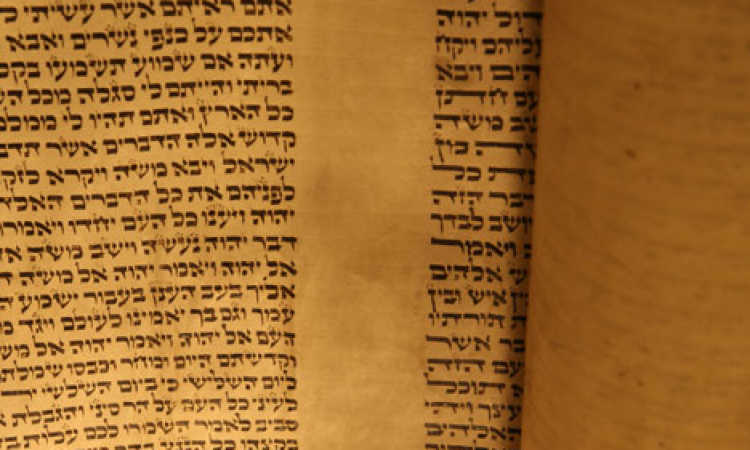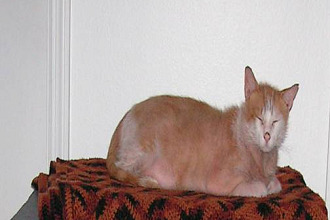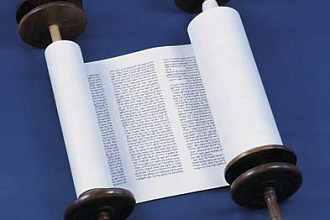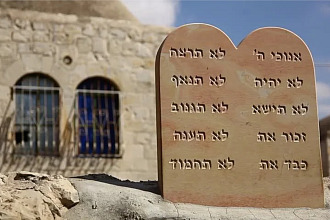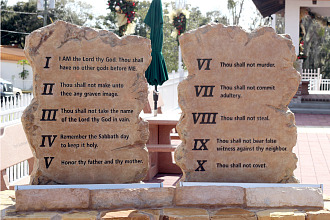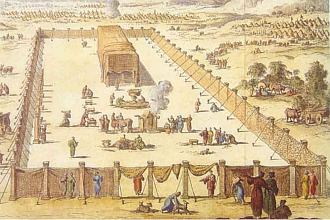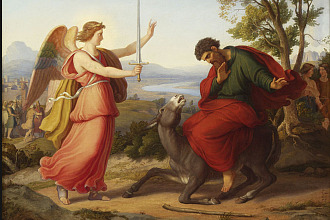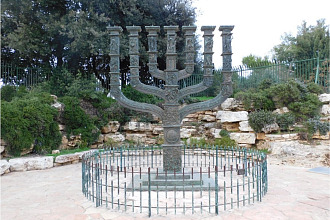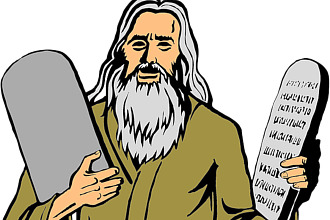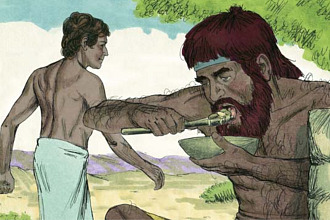Parasha for the Week: Vayetsei: Genesis 28:10 – 32:13
Haftarah for the Week: Hosea 11:7 – 14:10
Besorat Yeshua: Mark 11:27 – 12:6
Overview
Fleeing from Esav, Yaakov sets out for Charan, the home of his mother's family.
Yaakov Arrives at Bethel, Hebrew word meaning House of God.
He sleeps there and dreams of angels going up and down a ladder between Heaven and earth. G-d promises that he will found a great nation and that he will enjoy Divine protection.
Yaakov wakes and vows to build an altar there and tithe all that he will receive.
In Charan he meets his cousin Rachel at the well. He arranges with her father, Lavan, to work seven years to marry her, but Lavan fools Yaakov, substituting Rachel's older sister, Leah
Yaakov commits himself to work another seven years in order to also marry Rachel.
Leah bears four sons: Reuven, Shimon, Levi and Yehuda, the first Tribes of Israel.
Rachel is barren, she gives her handmaiden Bilhah to Yaakov to bear children for her.
Bilhah bears Dan and Naftali. Leah gives Yaakov her maiden Zilpah, who bears Gad and Asher.
Leah then bears Yissachar, Zevulun, and a daughter, Dina. Rachel has a son, Yosef.
Yaakov decides to leave Lavan, but Lavan, aware of the wealth Yaakov has made for him, is reluctant to let him go, and concludes a contract of employment with him.
Six years later, Yaakov, aware that Lavan is resentful of his wealth, flees with his family.
Lavan pursues them but is warned by G-d not to harm them.
Yaakov and Lavan agree to a covenant and Lavan returns home.
Yaakov continues on his way to face his brother Esav.
"Yaakov and the Ladder"
Yaakov goes to Charan, but on the way he stops and lies down to rest. He falls asleep and the Torah relates the dream Yaakov has. In his dream he saw, "a ladder stood upon the earth and the top of the ladder reached into heaven and G-d's angels ascended and descended upon it." In his dream G-d assures him that He will be with him and protect him wherever he will go and that G-d will eventually bring him back to this land. Yaakov wakes up refreshed and energized and says a special prayer. What is the significance of this ladder? According to our sages, the ladder represents: prayers through which we connect to G-d and intercession. Through the ladder of prayer we connect to G-d. The Torah tells us that in his dream Yaakov saw, "a ladder stood upon the earth and the top of the ladder reached into heaven." According to Yochanan the ladder represents the Mashiach, "Very truly, I tell you, you will see heaven opened and the angels of God ascending and descending upon the Son of Man." (Yochanan 1:51) The angels ascend and descend upon the Messiah, because he is the one who stands for us. He is the one who intercedes for us, he is the one who is the link between heaven and earth.
"Tithe"
On the way to his uncle Laban in Charan, the Torah tells us: "Jacob vowed a vow saying: If God will be with me and keep me in this way that I go...I will surely give a tenth to you" (Genesis 28:20, 22) Yaakov understood that returning ten percent of all G-d's increase to us is a minimum demonstration of appreciation for His blessings to us.
"Controlling Anger"
The Torah states: "And when Rachel saw that she did not bear children to Jacob, Rachel envied her sister. And she said to Jacob: 'Give me children, if not I am as a dead woman.' And Jacob's anger was kindled against Rachel; and he said, 'Am I in the place of God, who has withheld from you the fruit of the womb?' " (Genesis 30:1-2)
Rabbi Pakouz quoting Rabbi Yeruchom Leibovitz who cites the Sforno who explains that Jacob grew angry at Rachel because she said, "Give me," implying that her bearing a child was dependent on Jacob, rather than on God's will. His anger was for the Almighty's honor and this took precedence even over his love for Rachel.
"G-d's Blessings"
A man came to Rabbi Israel of Ruzhin to ask the Rabbi's advice and blessing for an urgent problem he had. When he came out of the Rabbi's room he met the Rabbi's son and told him about the problem. "What did my father tell you?" Inquired the Rebbe's son. "He said, "Not to worry for G-d will help!" "But what will you do until G-d sends His help?" Inquired the boy. The man realized that the boy was right. He again went into the Rabbi's room and asked, "Rabbi, what will I do until G-d helps me?" "Don't worry," replied the Rabbi, "G-d will help you even until He helps you!" Then the Rabbi added, "This is exactly what G-d told Yaakov, 'I will not leave you until I have done that which I have spoken to you.'" G-d told Yaakov that even when it may seem that G-d's promise is not yet fulfilled, he should know that even during that time G-d will be with him!
We too must remember that even during difficult times when we do not see G-d's blessings in a revealed way, we must know that even then G-d is watching over us and is with us.
HAFTARAH Hosea 11:7 – 14:10
Parasha: This week's Parasha tells us that Yaakov left his home to go to his Uncle La-van's house. On the way he slept in Bethel and had a dream – the dream of the ladder. "He came to a certain place and stayed there for the night... And he dreamed that there was a ladder set up on the earth, the top of it reaching to heaven; and the angels of God were ascending and descending on it. And the LORD stood beside him and said, "I am the LORD, the God of Abraham your father and the God of Isaac; the land on which you lie I will give to you and to your offspring;" (Genesis 28:11-13).
Haftarah: Hosea reminds us of Yaakov's dream saying. "He met him at Bethel, and there He spoke with him. The LORD the God of hosts, the LORD is his name!" (Hosea 12:4,5). It is interesting that Hosea said that Yaakov met the Lord and spoke to him and Yochanan said it was Yeshua, "The Son of Man," the title of the Mashiach in Daniel 7.
Parasha: God spoke directly to Yaakov . "Then the LORD said to Yaakov, "Return to the land of your ancestors and to your kin¬dred, and I will be with you." (Genesis 31:3).
Haftara: Hosea reminds us that Yaakov was guarded by God. No prophet spoke to Yaakov. God spoke directly to him, not like when the people of Israel left Egypt. "Yaakov fled to the land of Aram, there Is¬rael served for a wife, and for a wife he guarded sheep. By a prophet the LORD brought Israel up from Egypt, and by a prophet he was guarded. (Hosea 12:12-13).
Parasha: God will be with Yaakov. "I am the God of Bethel, ... Now leave this land at once and return to the land of your birth.'" " (Genesis 31:13).
Haftarah: Hosea said that the return of Yaakov to his land will also be a return to God, Yaakov is the rep¬resentative of God's people who are to return to God. "Return, O Israel, to the LORD your God" (Hosea 14:1).
Besorat Yeshua Mark 11:27 – 12:6
Parasha: Yaakov's authority was questioned by Esau. Esau disagreed with Yaakov and wanted to cancel their deal about the firstborn's rights "Your brother Esau is consoling himself by planning to kill you." (Gen. 27:42)
Besorah: The scribes and elders questioned Yeshua's authority. "the chief priests, the scribes, and the elders came to him and said, "By what authority are you doing these things? Who gave you this authority to do them?" " (Mark 11:27-28).
Parasha: Esau's opposition to his brother Yaakov has become the type of all opposition to God's people.
Besorah: Yeshua applied this opposition to his own person in a prophecy. He explained it by a parable. "A man planted a vineyard, put a fence around it, dug a pit for the wine press, and built a watchtower; then he leased it to tenants and went to another country. When the season came, he sent a slave to the tenants to collect from them his share of the produce of the vineyard. But they seized him, and beat him, and sent him away empty-handed. And again he sent another slave to them; this one they beat over the head and insulted. Then he sent another, and that one they killed. And so it was with many others; some they beat, and others they killed. He had still one other, a beloved son. Finally he sent him to them, saying, 'They will respect my son.' But those vinedressers.. took him and killed him..." (Mark 12:1-8).

